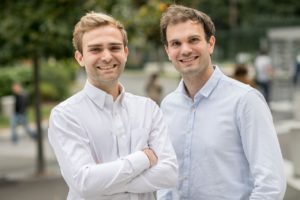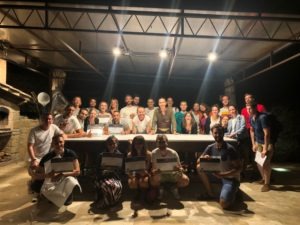Industry Spotlight: Eligo Bioscience
Eligo Bioscience is Inventing Novel Approaches to Microbiome Medicine
More on Eligo Bioscience
The Founders
Dr. Xavier Duportet
Dr. David Bikard
Dr. Timothy Lu
Dr. Luciano Marraffini
Company Website
Company LinkedIn
Eligo in the News
1. Eligo Bioscience: News and Press Talks
Publications
1. Exploiting CRISPR-Cas nucleases to produce sequence-specific antimicrobials
2. Sequence-specific antimicrobials using efficiently delivered RNA-guided nucleases
The study of the human microbiome promises to revolutionize the way we treat disease. Until recently, we had little understanding of the collective role of bacteria in human health. Our approach to treating bacterial infections with traditional antibiotics was less than nuanced, and has led to major challenges in medicine, like antibiotic resistance and the elimination of beneficial bacteria. But what if we could change that? What if there was a way to treat harmful infections without the threat of antibiotic resistance? What if we could treat pathogenic bacteria without impacting our commensal microbiota? What if we could even manipulate the beneficial bacteria of the human microbiome to produce therapeutic effects on the body? This is where Eligo comes in.

Eligo founders Dr. Xavier Duportet (left) and Dr. David Bikard (right)
Eligo Bioscience is an early growth-stage biotech company focused on designing biotherapeutics that selectively target bacteria, both foreign and native to the human microbiome, to treat illness. Eligo was founded by scientists from Massachusetts Institute of Technology and Rockefeller University and was incubated at Institut Pasteur in France by leading experts in CRISPR, phage engineering, and microbiome editing. Eligo received an $18M Series A led by Khosla Ventures and was recently elected as a Technology Pioneer by the World Economic Forum. Brought to life by Drs. Timothy Lu, Luciano Marraffini, Xavier Duportet and David Bikard, Eligo is joining the precision medicine revolution and inventing novel methods for tackling disease. Their team of scientists has come from all over the world to bring Eligo’s vision to life, and they are united by a common mission: to bring microbiome engineering out of the lab and into the world where it can radically change medicine and save lives.
Fighting Illness with Biological “Nanobots”
Eligo’s technology, known as EligobioticsTM, leverages microbial ecology, bacteriophages, and genetic engineering with nucleases in order to target and treat illnesses. EligobioticsTM can be thought of as programmable, biological “nanobots,” as Xavier calls them. These nanobots can be programmed to search for a particular type of bacteria in the microbiome, either pathogenic or non-pathogenic, and have a designated therapeutic effect on that bacteria.
Why Benchling?
Erica: It's more well adapted to share all of the knowledge and all of the results that have been obtained with a certain piece of DNA. It's not just a string of letters with an annotation by itself.
Remi: We use Benchling to design, record and share DNA constructs and primers. For this workflow Benchling is a good fit given our needs.
Fabien: It is very convenient to quickly access data from previous experiments.
EligobioticsTM (the nanobots) are engineered and non-replicative bacteriophages that are equipped with a nuclease. Once the EligobioticTM finds and delivers these synthetic genetic instructions to target populations of bacteria, the CRISPR-Cas complex will selectively create a double strand break in the genome of the bacteria if it contains the sequence specifically targeted by the CRISPR-Cas system, effectively killing the bacteria. If the bacteria that receives the CRISPR-Cas system is not actually targeted by the system, it will survive. And EligobioticsTM do this all while leaving the neighboring, commensal microbiota untouched. This versatility positions Eligo at the crux of both antibiotics and microbial therapies. The company's new technology can not only combat or even counteract antibiotic resistance, but the team is also now pretty sure it can also create medicines out of the existing microbiome by delivering genetic instructions other than Cas9 nucleases.
Inspiration Turned Mission
Xavier Duportet, CEO and Co-Founder of Eligo Bioscience, was interested in synthetic biology well before Eligo came to be. Xavier received his PhD in a program under co-supervision by Massachusetts Institute of Technology and National Institute for Research in Computer Science and Automation (Inria), where he was developing synthetic gene networks in order to create novel therapeutic approaches. At the same time, Xavier's friend and future co-founder David Bikard was a postdoctoral fellow at the Rockefeller Institute, where he was studying CRISPR-Cas systems in bacteria. After numerous brainstorming sessions, they had the idea to test the delivery of CRISPR-Cas systems via phage particles in bacteria and demonstrated for the first time that targeting chromosomal genetic sequences with the Cas9 nuclease efficiently kills the bacteria. They had invented a novel method of developing antibiotics and treating bacterial infections. This technology (now called EligobioticsTM), promised to solve a host of major medical problems that previously had scarce solutions. And with it, they returned to Paris to found Eligo Bioscience.
A Day in the Lab is a Day on the (Ant) Farm
While office pets are fairly common, Eligo goes beyond the traditional cat or dog and is home to two colonies of ants! With roughly 10,000 ants in the farms, many employees have taken to cutting up leaves for their leaf-cutter ants to do what they do best: cut leaves. What started as CEO Xavier’s lifelong love of ants has become a team-wide interest in colony dynamics.
An International Team United by a Common Goal
As word about the science behind Eligo spread, scientists from all over came to Paris to join Xavier and David, united by a common goal to solve major medical problems. At Eligo’s start, Xavier was still completing his PhD, and the company began to grow—two scientists in its first year, two more scientists and a research engineer the next, until they received their Seed funding. Eligo now has a team of 29 and is still growing.
Many on this team have truly traveled from far and wide to join Eligo. Spanning the European continent and beyond, Eligo team members have come from France, The US, the UK, Brazil, the Netherlands, Germany, Spain, Sweden, Poland, Italy, and many relocated to Paris specifically to work at Eligo. According to Erica Lieberman, one of Eligo’s earliest employees, the team’s quilted nationalities drive morale, and, “it reinforces the team spirit to know that people are working here because they really want to be here!”
Independent Journeys Tell a Similar Story
Each team member has a unique path that led them to Eligo. For Erica, it was a sudden change of plans. When Erica graduated with her degree in bioengineering, she had every intention of staying in the San Francisco Bay Area to work at a startup. But when she found out about Eligo, everything seemed to click—their research aligned with her previous work on and interest in the microbiome, phages, and CRISPR, and they were tackling important, fascinating problems like antibiotic resistance. Moving to Paris just made sense if it meant she could work for this team. Erica started as a research engineer when the company was just 5 employees. Today, she is the team’s Head of Discovery and Automation.
Like Erica, other team members felt drawn to Eligo because they wanted to have a formative role in the ground-breaking research and the evolution of the company. Antonina Krawczyk is an Eligo scientist who received her Ph.D. at the University of Groningen in the Netherlands. Antonina wanted to work for a startup with a young, innovative, and dynamic team that was tackling “worldwide” problems. She’s both inspired scientifically by the work that Eligo is doing, and inspired personally by her team. Marion Arraou, who studied at Université Paul Sabatier Toulouse III in southern France and is now a research engineer at Eligo, joined the team because of the company's mission to help people and save lives. As Marion puts it, “I wanted to be proud of my work and feel that what I do every day really matters.” Rémi Terrasse, who was previously a postdoc at Jacobs University Bremen in Germany and is now an Eligo synthetic biologist, joined the team because, “the increase in antibiotic resistance is a real concern...and Eligo is addressing the problem in a creative way.”

The Eligo team at a recent company offsite.
Eligo’s mission to develop cutting-edge technology that solves difficult problems is the gravitational force that brings in bright minds from all over the world. It is also the glue that holds this team of global researchers together and shapes the way they work. Their team is incredibly collaborative—Eligo scientists are constantly sharing ideas, materials and constructs, and results. And this collaboration goes beyond their research. As Erica puts it, “we celebrate our successes together and take care of one another and help out when someone is having a hard time.”
Looking to the Future
Eligo has made tremendous strides since their inception at Massachusetts Institute of Technology and the Rockefeller Institute. After residing at the Institut Pasteur, Eligo Bioscience is now a resident of the Paris Biotech Santé’s biotech cluster at the Hôpital Cochin. As they look to the future, the team will continue to grow and expand, and Xavier sees their lead product on the market in four years, with more products in clinical trials. And of course, he hopes to continue to expand their exploratory research so that Eligo will make the biggest impact possible. Reflecting on his vision for Eligo, Xavier says, “we want to be the leader in the microbiome engineering field by becoming the best at manipulating the microbiome through the efficient delivery of genetic circuits.” With EligobioticsTM, the world will have enhanced therapeutics for combatting disease.